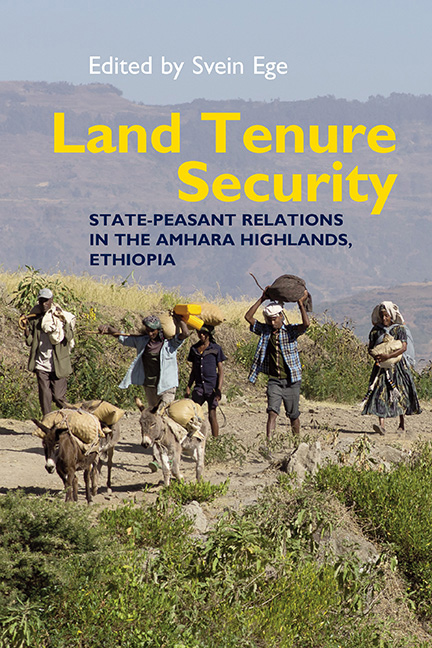Book contents
- Frontmatter
- Dedication
- Contents
- List of Illustrations
- Note on Transliteration
- Dates and Measures
- Contributors
- Preface
- Glossary
- Map
- 1 Introduction
- 2 Peasant Land Tenure: A Critical Review
- 3 The Dersha System: Rethinking Land Tenure under the Därg
- 4 Land Tenure in Gojam under the Därg
- 5 Land Tenure in Baba Säat, North Wälo
- 6 Rich and Poor: Land and Wealth in Mäqét, North Wälo
- 7 Rural Land and Urban Aspirations: Future Orientation in a Time of Change
- 8 An Unstable Land Tenure System
- 9 Conclusion
- Postface
- Select Bibliography
- Index
- Eastern African Studies
9 - Conclusion
Published online by Cambridge University Press: 26 March 2019
- Frontmatter
- Dedication
- Contents
- List of Illustrations
- Note on Transliteration
- Dates and Measures
- Contributors
- Preface
- Glossary
- Map
- 1 Introduction
- 2 Peasant Land Tenure: A Critical Review
- 3 The Dersha System: Rethinking Land Tenure under the Därg
- 4 Land Tenure in Gojam under the Därg
- 5 Land Tenure in Baba Säat, North Wälo
- 6 Rich and Poor: Land and Wealth in Mäqét, North Wälo
- 7 Rural Land and Urban Aspirations: Future Orientation in a Time of Change
- 8 An Unstable Land Tenure System
- 9 Conclusion
- Postface
- Select Bibliography
- Index
- Eastern African Studies
Summary
Ethiopia is still mainly a rural society. It is also one of the world's poorest countries, despite rapid development in recent years. There is good reason to believe that these two elements are linked, as indicated by repeated famines that have hit the rural, food-producing areas. Serious efforts to change this situation started in the late imperial period and became key policy aspects under the Därg and later the EPRDF. There is widespread agreement that the measures in the imperial period were too little, too late, while those under the Därg were often tragically misguided. Those of the EPRDF, still evolving, are up for discussion.
Most Ethiopian farmers are smallholders. For centuries, the rights and obligations of peasants in the land they farm have shaped Ethiopian society. Much changed with the land reform of 1975, but for the peasants concerned, these rights are as important as ever. These rights are, in our view, so much more than what can be covered by the term ‘usufruct rights’, and even if we were to accept the term as a fair description, one would still have to specify how, and under what conditions, peasants practice these usufruct rights. In order to develop its economy, Ethiopia will certainly require large investments. By contrast, good land tenure policy is not expensive, but bad policy can be very destructive, as amply illustrated by some of the programmes under the Därg. Policies are most likely to succeed if they emanate from a good understanding of the concerns and the practices of those to be reformed. It is therefore a problem that the land tenure practices of Ethiopian peasants have not been much studied.
In this book, we seek to contribute to the relevant body of knowledge in two ways: firstly by the specific descriptions and arguments we provide, and secondly by asking for more research, not the least to assess and challenge our own arguments. We hope that even those who disagree with our specific arguments may agree to the need, even urgency, for improved knowledge of peasant land tenure. We focused on the Amhara region, which is probably the region best covered in the research literature. We demonstrate that even here, there has been virtually no research on peasant land tenure practices.
- Type
- Chapter
- Information
- Land Tenure SecurityState-peasant relations in the Amhara Highlands, Ethiopia, pp. 153 - 158Publisher: Boydell & BrewerPrint publication year: 2019
- 1
- Cited by



